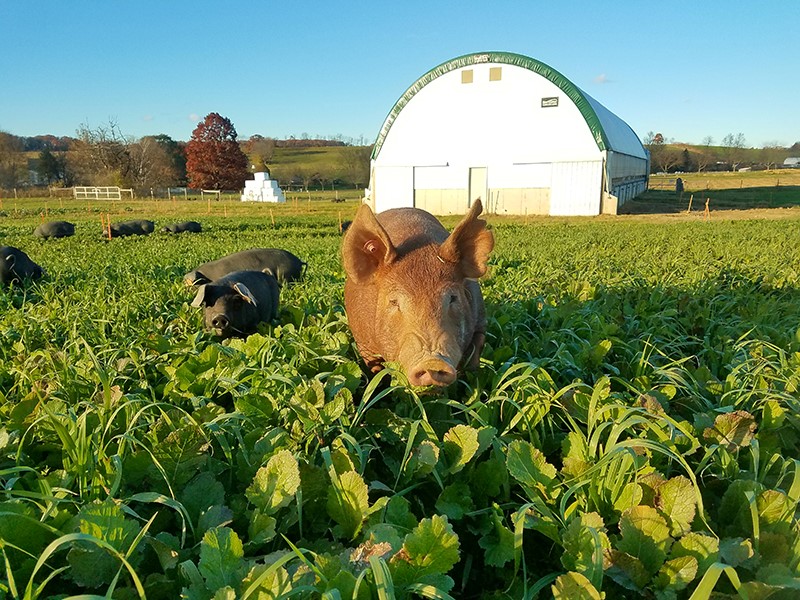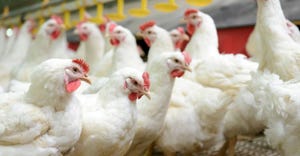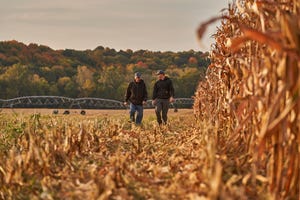USDA awards $499,542 for three-year study of manure and pasture management strategies that can control swine parasites in organic swine operations.
December 19, 2018

Parasites in organic swine operations present challenges such as poor animal health, minimal productivity and efficiency for producers and potential threats to food safety and the environment, according to an announcement from the Rodale Institute, which noted that swine parasites are a significant barrier for such operations because of the lack of organically approved control measures.
In response, researchers at Rodale Institute, the University of Minnesota and Kutztown University developed a project to address challenges expressed by producers.
The U.S. Department of Agriculture awarded $499,542 to the research partners for a three-year study of manure and pasture management strategies that can control swine parasites in organic swine operations.
Rodale said the project includes four objectives:
1. Evaluate parasite prevalence on organic swine farms;
2. Determine the effectiveness of manure composting;
3. Assess biofumigation as a parasite management approach, and
4. Determine the effects of organic pigs grazing biofumigation pastures.
The project team plans to use four approaches to address swine parasites in pastured pig operations.
First, Rodale said a comprehensive study of parasite prevalence on organic pig farms will be completed. Project leaders will conduct farm visits across four states that represent about 30% of national organic pig farms and more than 60% of national organic pork sales.
Second, swine manure bedpack will be thermophilically composted in windrows as a strategy to eliminate swine parasites, Rodale said, suggesting that high composting temperatures are the leading mechanism for parasite destruction.
Third, biofumigation will be examined a pasture management strategy to remove parasites from field soil, the institute explained. Biofumigation -- a technique used by crop farmers to manage soilborne plant pathogens, weeds, insects and nematodes -- functions by incorporating specific plant residues into the soil that rapidly release toxic isothiocyanates. Mustard plants (Brassicaceae family) in particular are often reported for their biofumigation potential, and there is evidence that some mustards have anthelmintic properties, Rodale suggested. However, using mustards to kill or suppress swine parasites in pastures has never been tested, indicating a novel integrated crop/livestock approach to parasite management.
Fourth, team leaders will investigate two different approaches to incorporating biofumigation pastures into the soil: biologically through pig grazing or mechanically with equipment.
According to Rodale, the National Organic Program requires bedded floors and access to outdoor pastures, but these are the major sources of parasite contamination in organic swine operations. Until now, there has not been a comprehensive study of parasite prevalence in organic swine operations in the U.S., the institute said, leaving the extent of the problem unknown.
The long-term goal of this project is to develop manure and pasture management strategies for organic and transitioning swine operations that mitigate swine parasite contamination and transmission, Rodale announced. Successful completion of the project objectives will provide producers with effective tools to overcome challenges associated with swine parasites and, ultimately, will increase organic swine production across the U.S., the researchers concluded.
In a related blog post, Rodale said in order for organic pig operations to remain economically competitive with industry standards, additional high-quality, low-cost feed sources and novel integrated crop/livestock management strategies are required to finish organic pigs. These strategies must additionally consider the control of swine parasites without prophylactic treatments, which is challenging considering that semi-free-range pigs can be infected with a higher diversity of parasite species at higher abundances relative to those in non-organic, indoor production operations, the institute said.
Read the full USDA award announcement here.
The Rodale Institute is a 501(c)(3) nonprofit dedicated to pioneering organic farming through research and outreach. For 70 years, the institute has been researching the best practices of organic agriculture and sharing findings with farmers and scientists throughout the world, advocating for policies that support farmers and educating consumers about benefits of going organic.
You May Also Like



